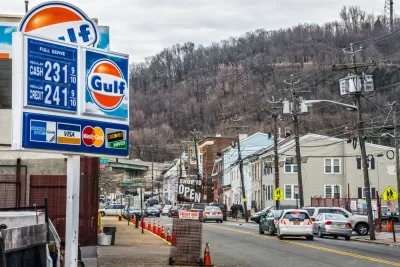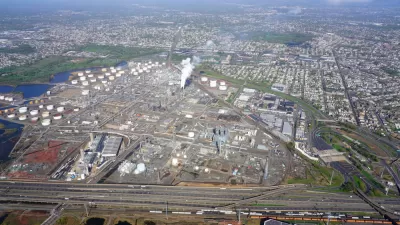Will a dozen East Coast states and D.C. agree to a regional plan that would likely hike gas prices through a "cap-and-invest" program to mitigate tailpipe emissions similar to what California has done for the last five years?

a climate reporter for The New York Times. The plan "sets a cap, to be lowered over time, on the total amount of carbon dioxide that can be released from vehicles that use transportation fuels, like gasoline and diesel fuel."
The 12 participating states in the Transportation and Climate Initiative (TCI) are Connecticut, Delaware, Maine, Maryland, Massachusetts, New Hampshire, New Jersey, New York, Pennsylvania, Rhode Island, Vermont, and Virginia.
This is a politically formidable undertaking on a regional level – essentially asking motorists to pay more for gasoline in order to fight climate change. Push-back occurred immediately from one of the TCI member-states.
uel suppliers are required to purchase pollution permits to cover the carbon pollution produced when the fuel they supply is burned."
To the extent that the carbon content of fuels will be considered by TCI, the other California program is the Low Carbon Fuel Standards program, adopted by CARB in 2009 based on landmark legislation passed three years earlier. It assigns a "carbon intensity" to every transportation fuel sold in the state based on comprehensive lifecycle emissions, similar to the lifecycle analysis done by the U.S. EPA for its Renewal Fuel Standard.
Tabuchi notes that transportation is the largest source of emissions in each jurisdiction except Pennsylvania, accounting for 40 percent of the region's transportation emissions, according to the Energy Information Administration, nearly the same percentage as California, where transportation emissions have increased for the last five years, notwithstanding the fact that more than half of the nation's electric vehicles are registered in the Golden State.
Next steps
is "expected in the Spring of 2020, following additional public input and analysis. At that time each of the 12 TCI states and the District of Columbia will decide whether to sign the final MOU and participate in the regional program, which could be operational by 2022."
“If designed well, this can be the most significant sub-national climate policy ever," Jordan Stutt, carbon programs director at the Acadia Center, a research and public interest group in New England that is pushing for cleaner energy, told the Times. Now it remains to be seen how many of the 13 jurisdictions adopt the plan.
Related in Planetizen:
-
Reducing Transportation Emissions by Targeting Fuel Suppliers, October 5, 2019
-
An East Coast Cap-and-Invest Approach to Reducing Transportation Emissions, December 20, 2018
-
Paying for Climate Change Mitigation at the Pump in California, August 13, 2018
FULL STORY: Eastern States Introduce a Plan to Cap Tailpipe Pollution

Planetizen Federal Action Tracker
A weekly monitor of how Trump’s orders and actions are impacting planners and planning in America.

Maui's Vacation Rental Debate Turns Ugly
Verbal attacks, misinformation campaigns and fistfights plague a high-stakes debate to convert thousands of vacation rentals into long-term housing.

Restaurant Patios Were a Pandemic Win — Why Were They so Hard to Keep?
Social distancing requirements and changes in travel patterns prompted cities to pilot new uses for street and sidewalk space. Then it got complicated.

In California Battle of Housing vs. Environment, Housing Just Won
A new state law significantly limits the power of CEQA, an environmental review law that served as a powerful tool for blocking new development.

Boulder Eliminates Parking Minimums Citywide
Officials estimate the cost of building a single underground parking space at up to $100,000.

Orange County, Florida Adopts Largest US “Sprawl Repair” Code
The ‘Orange Code’ seeks to rectify decades of sprawl-inducing, car-oriented development.
Urban Design for Planners 1: Software Tools
This six-course series explores essential urban design concepts using open source software and equips planners with the tools they need to participate fully in the urban design process.
Planning for Universal Design
Learn the tools for implementing Universal Design in planning regulations.
Heyer Gruel & Associates PA
JM Goldson LLC
Custer County Colorado
City of Camden Redevelopment Agency
City of Astoria
Transportation Research & Education Center (TREC) at Portland State University
Jefferson Parish Government
Camden Redevelopment Agency
City of Claremont





























